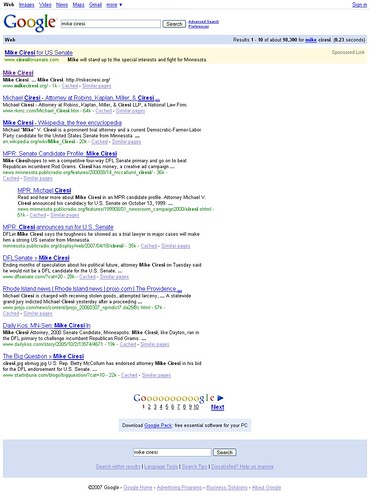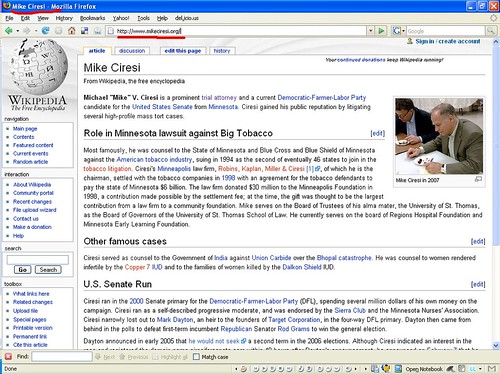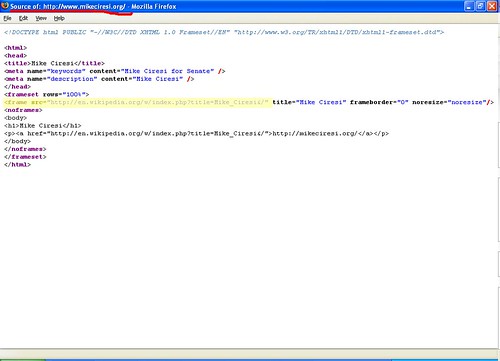I originally published this story in the June 7, 2007 issue of the Politics In Minnesota newsletter. I’m posting it here because it has a lot of bearing on Internet marketing in general and on online reputation management in particular.
Cybersquatting & Wikipedia Intrigue
A Google search for the words "mike ciresi"
revealed an interesting Internet marketing tactic. But by whom remains
a mystery. At the very top of the search results you’ll see a
highlighted link that is labeled a "Sponsored Link." That’s an ad
purchased by the Ciresi campaign that points to the ciresiforsenate.com
site.
It’s the first link in the "natural" or non-advertising search results that’s interesting. That link reads Mike Ciresi and points to mikeciresi.org. Clicking on that link takes you to what appears to be, and is–and isn’t–Ciresi’s Wikipedia entry.
It is
the Wikipedia entry in your browser but that entry is "surrounded" by
the mikeciresi.org domain. If you click on any link on the Wikipedia
page, you’ll notice in your browser’s address bar that the address of
the page never changes; it always remains at mikeciresi.org. Mike
Ciresi’s Wikipedia page is located at
http://en.wikipedia.org/wiki/Mike_Ciresi yet that address never shows
up in your address bar.
The technique is called domain masking.
It entails some simple HTML code called "framesets" that essentially
encloses all browser activity within the domain that is used for
masking purposes. You can see how it works by using your browsers’
"view source" function when you’re at mikeciresi.org.
In effect, you never leave mikeciresi.org but can surf the Web within it.
The only way to escape the domain is by hitting your back button until
you reach your original Google search or by typing a different domain
in your browser’s address bar.
There is nothing sinister at all to this practice per se though it’s a bit of a mystery as to why it is
being done in this case.
The domain mikeciresi.org ranks 1st
when you search for "mike ciresi" because it contains the words "Mike
Ciresi" in the Title area of the site that shows up on your browser’s
title bar and the words are contained within the domain itself, an
important consideration for Google rankings.
The campaign’s domain, ciresiforsenate.com, has not been optimized for the phrase
"mike ciresi." That basically means that those words have not been
placed prominently or strategically enough on the pages of the site for
Google to recognize that that is the topic of the site. It explains
both why that domain does not rank well for Ciresi-related searches and
that in turn explains why the campaign is buying ads on Google.
Though Google knows about ciresiforsenate.com (it has 21 pages from the site in its index),
the search engine obviously doesn’t consider the site relevant enough
for the search "mike ciresi." Further searching revealed [NOTE: The following data was accurate when this piece was originally published but have since changed, possibly due to search marketing done by the campaign]:
- mike ciresi us senate campaign website – no links on the first page of Google
- mike ciresi senate campaign web site – no links on the first page of Google
- mike ciresi us senate – no links on the first page of Google
- mike ciresi for senate – no links on the first page of Google
- ciresi for senate 1 link to mikeciresi.org and no links to ciresiforsenate.com on the first page of Google
The ciresiforsenate.com domain name was purchased on February 11, 2005 by Ciresi’s State Director Kerry Greeley (Tim Walz‘ former campaign manager). Six months later the mikeciresi.org domain was purchased anonymously from a domain registrar in Germany on July 14, 2005.
Greeley does not know who registered mikeciresi.org and no one has contacted the campaign about it.
But why mask Ciresi’s Wikipedia entry?
There are only two reasonable explanations: 1) Since mikeciresi.org points to
the relatively innocuous Wikipedia page, the domain is controlled by
someone outside, but friendly to, the campaign, or 2) the domain is
controlled by someone who may or may not be a friend but, if hostile,
may be pointing it at Wikipedia to keep their powder dry, so to speak.
Considering that the domain was purchased on foreign soil, if you will,
the safe bet is on the latter. Also, since Google tends to rank
Wikipedia pages near the top, masking that page may be an attempt to
fool Google into thinking the domain is a Wikipedia entry so it will
rank well.
View the screenshots (click on the graphic for more detail):
Google Search For "mike ciresi":
mikeciresi.org Masking Mike Ciresi’s Wikipedia Entry:
HTML Source Of mikeciresi.org Pointing To Wikipedia Entry:
The e-Strategy Academy covers all aspects of digital marketing including search optimization & marketing, email marketing, social media marketing, video marketing, mobile marketing & public relations.


